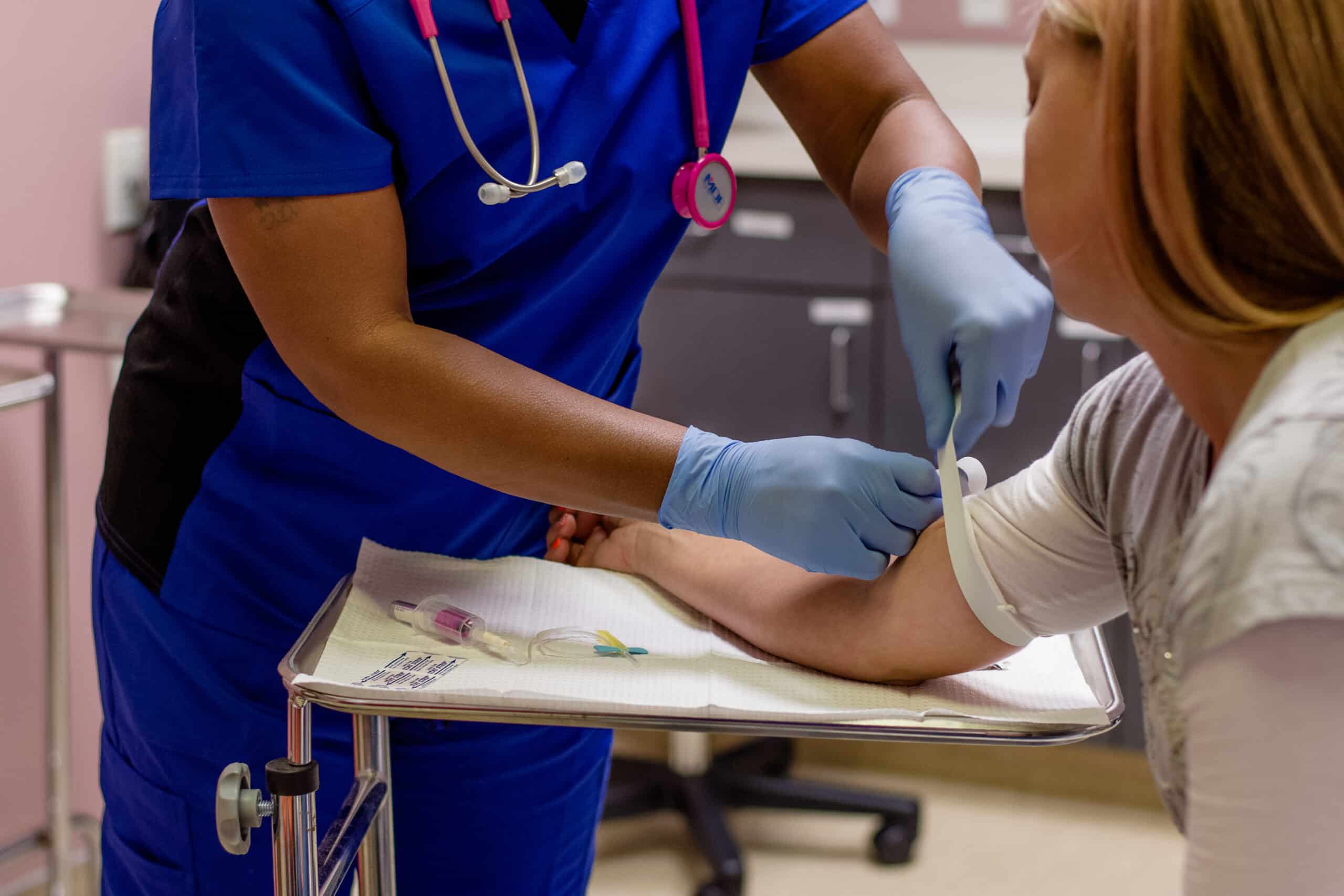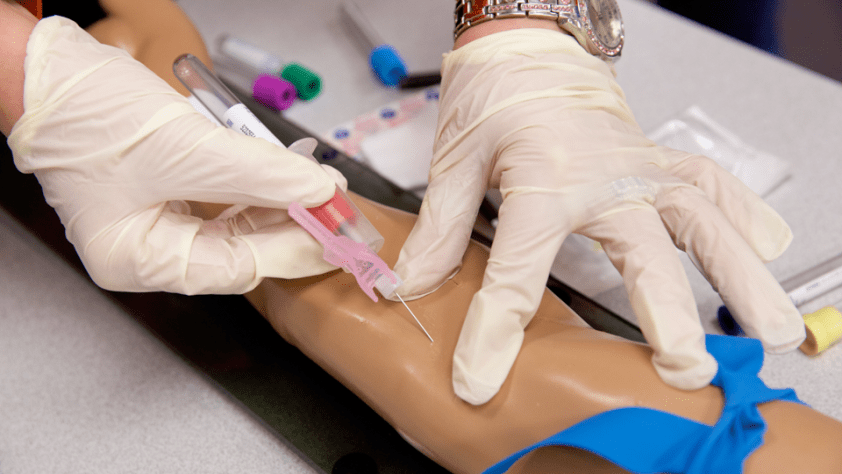Phlebotomy Classes Near Me: What You Should Know
Phlebotomy Classes Near Me: What You Should Know
Blog Article
Checking Out the Important Abilities Gained From a Phlebotomy Training Program for Aspiring Professionals
In a phlebotomy training program, you'll obtain crucial abilities that surpass just injuring. You'll master venipuncture strategies and learn the value of security protocols. You'll likewise develop the ability to connect efficiently with clients, which can relieve their stress and anxiety. Yet there's even more to it-- understanding makeup and handling laboratory devices are just the beginning. What various other necessary skills can you expect to obtain as you prepare for an occupation in this field?
Understanding Venipuncture Techniques
Understanding venipuncture methods is necessary for anybody pursuing a profession in phlebotomy. You'll need to create a strong grip of how to locate blood vessels efficiently. Start by exercising palpation abilities to feel for the ideal spots, typically in the antecubital fossa - Phlebotomy Training Course. It's all concerning being certain and mild while dealing with people.
You ought to acquaint yourself with the different needle dimensions and kinds, as picking the ideal one can make a distinction comfortably and performance. During the procedure, you'll find out to clean the website properly to minimize infection dangers.
Practicing the actual draw will help you comprehend the value of angling the needle correctly to access the capillary without triggering unnecessary discomfort. By improving these abilities, you'll not just obtain the depend on of your clients yet additionally ensure effective blood attracts, making you a proficient phlebotomist ready for the demands of the task.
Grasping Safety And Security Methods
As you perfect your venipuncture methods, it's just as essential to prioritize safety and security protocols to protect both on your own and your individuals. Acquaint yourself with infection control actions, like appropriate hand hygiene and making use of individual protective equipment (PPE) Always wear gloves when taking care of blood examples, and alter them between patients to decrease contamination threat.
You ought to additionally know just how to deal with and deal with sharps securely. Use designated sharps containers and comply with neighborhood guidelines for biohazard garbage disposal. Comprehending these methods not just keeps you secure but also guarantees your individuals.
Furthermore, stay upgraded on emergency procedures, like what to do in instance of a needle stick injury or a damaging response (Phlebotomy Courses Near Me). Routine training and refresher courses on safety procedures will improve your confidence and ensure you're constantly prepared. By understanding these precaution, you add to a much safer healthcare setting for everybody included
Developing Client Interaction Skills
In phlebotomy, developing rapport with patients is crucial for a positive experience. You'll need effective communication techniques to assist ease their concerns and handle any kind of anxiousness they might feel. By concentrating on these abilities, you can develop an extra comfortable setting for both you and your patients.
Structure Connection With Sufferers
Building connection with individuals is essential for effective phlebotomy technique. When you develop a link, patients feel extra comfy and at ease during treatments. By prioritizing connection, you not only enhance the person experience but additionally improve the accuracy of your work, guaranteeing that they're loosened up and cooperative during blood attracts.
Effective Communication Strategies
Effective communication methods are essential in phlebotomy, given that they aid you link with people and assure a smoother experience. To create your individual communication skills, concentrate on using clear and concise language. Always present on your own and describe your function, ensuring patients feel comfortable and educated. Proactively listen to their problems and concerns, as this reveals you value their input.
Be understanding and individual, particularly with those that may be anxious concerning the procedure. Exercising these techniques will certainly improve your capability to engage with individuals successfully and develop a favorable atmosphere during their sees.
Managing Patient Anxiousness
While it's all-natural for people to feel distressed about blood draws, you can play a necessary duty in easing their worries. You can likewise supply interruptions, like talking regarding light subjects or offering a tension sphere to capture. Assurance they're comfy and supported throughout the procedure, as a positive interaction can substantially lower their anxiousness and foster trust fund in your abilities as a phlebotomist.
Learning Composition and Physiology
Recognizing anatomy and physiology is vital for understanding phlebotomy abilities, as it assists you comprehend the body's framework and functions. You'll discover the blood circulation system, consisting of capillary, arteries, and blood vessels, which is essential for situating veins throughout blood draws. Acquainting on your own with the numerous sorts of blood cells and their roles will certainly improve your capacity to discuss treatments to individuals and recognize test results.
Furthermore, grasping the importance of various anatomical sites will make you more reliable in identifying the very best sites for venipuncture. You'll likewise check out exactly how the body replies to injury and the healing process, which can inform your technique.
Managing Lab Devices
Handling research laboratory devices is essential for guaranteeing precise results and a secure workplace. You need to remain on top of upkeep methods and comply with safety and security protocols to avoid crashes. By focusing on these techniques, you'll enhance your efficiency as a phlebotomist and secure both on your own and your people.
Tools Maintenance Strategies
Proper upkeep of lab tools is crucial for assuring accurate examination outcomes and the security of both clients and team. To keep your tools in top form, beginning by cleaning it consistently. Wipe down surfaces and components to prevent contamination and wear. Look for any kind of visit our website signs of damages or malfunction, and address these problems instantly. Adjust your devices according to the producer's standards to keep accuracy. In addition, preserve a log of maintenance tasks and inspections to track efficiency over time. Ascertain all materials, like needles and tubes, are saved effectively to lengthen their life-span. By developing a routine for tools treatment, you'll enhance integrity and efficiency in your research laboratory techniques.
Safety Methods in Labs
While it is important to keep lab tools, adhering to safety protocols is equally essential to secure everybody in the laboratory. Always put on suitable individual protective tools (PPE), like handwear covers and safety glasses, to lessen exposure to unsafe materials. Acquaint yourself with the place of safety and security devices, such as eyewash stations and fire extinguishers, ensuring they're obtainable. Correctly label and store all chemicals to stop crashes and mix-ups. When using sharp instruments, handle them carefully and dispose of them in assigned containers. Maintain your work space organized to decrease the danger of spills or injuries. Frequently inspect tools for any kind of signs of wear or breakdown, and record problems instantly. By following these methods, you contribute to a safer setting for everybody included.
Executing Quality Assurance Actions
Executing quality control Click This Link steps is important for guaranteeing the precision and dependability of phlebotomy methods. You require to regularly calibrate and maintain your tools, as even small inconsistencies can lead to significant errors in results.
Carrying out routine audits of your procedures can highlight locations requiring renovation and reinforce finest techniques. You must also join recurring training to stay updated on the most up to date techniques and technologies in the area. Motivating comments from associates can produce a society of team like this effort, where everyone is bought preserving top quality standards. By focusing on high quality control, you not just boost your very own skills however likewise add to far better client results and the overall stability of the healthcare system.
Navigating Lawful and Ethical Considerations
You'll require to familiarize yourself with legislations regarding person permission, discretion, and handling of organic materials. Always make certain you have actually informed consent from individuals before carrying out any procedures.
Ethically, you must respect patient privacy and maintain discretion at all times. Recognize the Medical insurance Mobility and Responsibility Act (HIPAA) guidelines, which control the handling of delicate health information.
Additionally, stay updated on your facility's plans and procedures to guarantee compliance with neighborhood laws and criteria. When doubtful, consult your manager or lawful resources - Phlebotomy Training Course. By focusing on these lawful and honest facets, you'll foster a secure setting for individuals and support the integrity of your profession
Frequently Asked Questions
What Occupation Opportunities Are Offered After Completing Phlebotomy Educating?
After completing phlebotomy training, you can go after profession opportunities as a phlebotomist in medical facilities, clinics, blood contribution centers, or research laboratories. You could additionally consider roles in research or medical assisting, increasing your specialist horizons.
Just how Long Does a Common Phlebotomy Training Training Course Last?

Is Accreditation Called For to Function as a Phlebotomist?
Yes, accreditation is commonly needed to work as a phlebotomist. It shows your abilities and understanding, making you much more competitive in the task market. Employers usually like certified candidates for these settings.
What Are the Expenses Related To Phlebotomy Training Programs?
Phlebotomy training programs normally cost between $700 to $3,000, relying on the institution and location. You'll additionally require to allocate textbooks, materials, and accreditation test charges, which can include in your overall costs.
Can Phlebotomy Training Be Finished Online?

Report this page